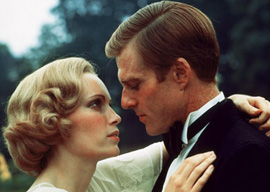
July 02, 2012

Mia Farrow and Robert Redford in The Great Gatsby, 1974
Nick went to Yale in the same class as Tom; Daisy is Nick’s second cousin once removed. It is no coincidence that Jay Gatsby’s waterfront palace in West Egg sits right across the inlet from Tom Buchanan’s estate in East Egg. At the end of Tom’s dock, there is a green light which shines all night. Gatsby watches that light from his front portico. He is fixated on it.
Gatsby has returned, intent against all odds and reason, to take up where he left off with Daisy. He is living in a dream world. Gatsby confides to Nick, “I’m going to fix everything just the way it was before. She’ll see.”
Nick cautions him, “You can’t repeat the past.”
Gatsby responds confidently, “Can’t repeat the past? Why, of course you can!”
Gatsby is a mystery man. He does not even make an appearance until the third chapter when Nick attends a party. Gatsby has casual open-house parties every weekend. They are well-attended. The partygoers don’t know Gatsby or anything about him. The talk is that Gatsby was a German spy, the illegitimate son of the Kaiser, a nephew to von Hindenburg, a bootlegger and a killer, among other things.
An anonymous gentleman sitting at a table with Nick asks, “Weren’t you in the Third Division during the War?” The gentleman is Gatsby. Nick and Gatsby fought in France together but were never formally introduced. The moment after Gatsby identifies himself, “a butler hurried toward him with the information that Chicago was calling him on the wire.”
Then at a midtown Manhattan luncheon, we meet Gatsby’s friend Meyer Wolfsheim, a gambler whom Gatsby claims fixed the 1919 World Series. Wolfsheim is a businessman, the proprietor of an outfit called “The Swastika Holding Company.” Later, after Gatsby is shot and killed, Nick pays Wolfsheim a visit in the vain attempt to get him to attend the funeral. Nick asks, “Did you start him in business?” Wolfsheim responds, “Start him! I made him…I raised him out of nothing, right out of the gutter.”
Fitzgerald keeps it vague. There are hints and clues. When Tom Buchanan begins to suspect that Gatsby and Daisy are having an affair, Tom asks Nick, “Who is this Gatsby anyhow? Some big bootlegger?” Tom decides to investigate. In the FT podcast, Sarah Churchwell, a professor of American literature, calls Gatsby a bootlegger, a precursor to present-day drug dealers. In the 1949 film adaptation, Alan Ladd is seen firing a machine gun at a rival gang of bootleggers.
One must assume securities fraud and forgery. Whatever it was, it outranked the drug-store rackets, which were just “small change”. Fitzgerald keeps us guessing. Recall in Chapter V the aborted, cryptic conversation between Nick and Gatsby about bonds? Gatsby asks, “…you don’t make much money, do you?…. You’re selling bonds, aren’t you, old sport?…. I carry on a little business on the side…. It happens to be a rather confidential sort of thing.” Gatsby is trying to pull Nick into the game and reward him for his help in inviting Daisy over for tea.
It hardly matters if any of this makes sense. What matters is the quality of Fitzgerald’s matchless prose. There has never been anything like it. No wonder there is a revival. Remember what Hemingway said about Fitzgerald in A Moveable Feast, “If he could write a book as fine as The Great Gatsby, I was sure he could write an even better one.” Perhaps Tender is the Night fits that bill. Again, stick with the book.